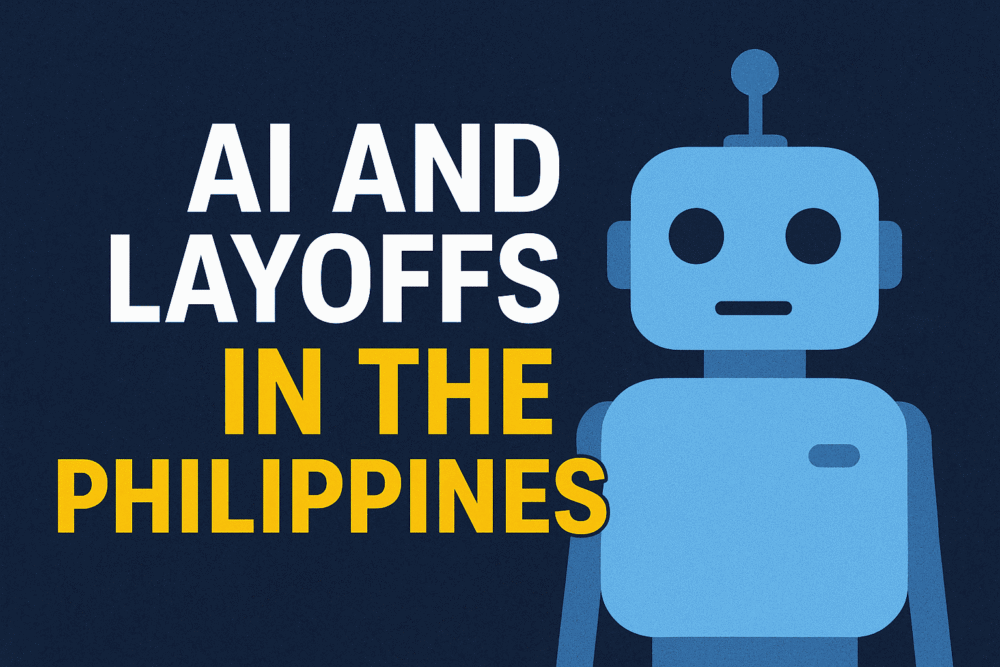In the past year, big tech companies abroad have been making headlines with massive layoffs. At first, people thought it was because of economic downturns or over-hiring during the pandemic. Pero kung titignan mo closely, one of the biggest reasons is Artificial Intelligence (AI).
AI is no longer just a buzzword—it’s already replacing jobs. Programmers, content writers, designers, even customer service agents—many of them are finding out the hard way that AI can do what they do, faster and cheaper.
The question is: are we ready in the Philippines when the same wave of AI-driven layoffs reaches us?
Which Filipino Jobs Are Most at Risk?
The Philippines is one of the biggest hubs for BPO and service-oriented jobs. Sadly, these are the very industries na pinaka-exposed sa automation.
- Customer Service / Call Center Agents – AI chatbots and voice bots are already handling basic customer inquiries.
- Writers and Content Creators – Basic content, copywriting, and even some journalism tasks are being replaced.
- Programmers – While senior engineers will remain valuable, many coding tasks can now be automated.
- Data Entry and Admin Jobs – Anything repetitive and rules-based is an easy target for AI.
This doesn’t mean mawawala agad lahat ng trabaho. But it does mean the demand will shrink, and competition for what’s left will be tougher.
Why You Need an Emergency Fund Now
If there’s one financial lesson from AI layoffs, it’s this: job security is not guaranteed anymore.
Building an emergency fund worth at least 3–6 months of your expenses is no longer optional—it’s a must. This safety net will give you breathing room if layoffs happen in your industry.
If you’re still living paycheck to paycheck, now is the time to start cutting unnecessary expenses and build that fund.
Invest Smarter: Don’t Rely on Just Your Salary
Kung aasa ka lang sa trabaho, mas risky na ngayon. This is why Filipinos should start building multiple income streams.
Some safer investment options to consider:
- Pag-IBIG MP2 – Stable, government-backed savings program with decent dividends.
- Retail Treasury Bonds (RTBs) – Good for conservative savers who want guaranteed returns.
- Index Funds / ETFs – For those who want exposure to long-term stock growth.
- Side Hustles or Online Businesses – Freelance work, e-commerce, or skills-based services that AI can’t fully replace.
The key is diversification. Huwag kang umasa sa isang source lang.
Upskilling: How to Stay Ahead of AI
Not all jobs will disappear—pero mag-iiba ang demand.
Skills that will remain valuable:
- Critical thinking and problem solving (AI can’t think outside its programming)
- Leadership and project management
- Creative strategy (AI can make designs, but humans set vision and direction)
- Hands-on professions (healthcare, skilled trades, etc.)
If you’re in a field at risk, start investing in learning new skills—online courses, certifications, or even shifting to industries less likely to be disrupted.
The Investor’s Angle: Which Industries Will Benefit?
Kung titingnan mo naman from an investor’s point of view, AI is not all bad news.
- Winners: Tech, fintech, automation, logistics, and e-commerce companies.
- Losers: Labor-intensive industries like BPOs, traditional outsourcing, and basic service jobs.
If you’re investing in the stock market, it’s worth looking at where AI adoption is growing versus where it will cut costs by replacing people.
Blogger’s Corner
Let’s be real: AI layoffs are not a “what if”—they’re already happening. The only question is how soon we’ll feel the impact here in the Philippines.
For us ordinary Filipinos, the solution is not to fear AI but to prepare for it. Build your emergency fund, diversify your income, and upskill in areas AI can’t easily touch.
Because whether we like it or not, the world of work has changed—and those who prepare will survive it better than those who don’t.
